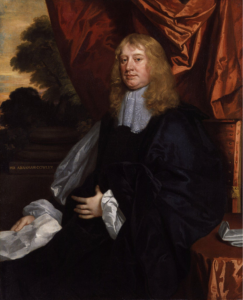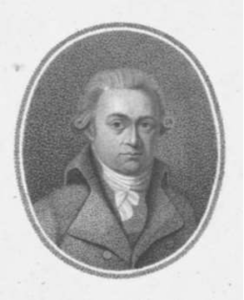The friend of women
(Poet's title: Der Weiberfreund)
Set by Schubert:
D 271
[August 25, 1815]
Noch fand von Evens Töchterscharen
Ich keine, die mir nicht gefiel:
Von fünfzehn bis zu fünfzig Jahren
Ist jede meiner Wünsche Ziel.
Durch Farb und Form, durch Witz und Güte,
Durch alles fühl ich mich entzückt:
Ein Ebenbild der Aphrodite
Ist jede, die mein Aug erblickt.
Selbst die vermag mein Herz zu angeln,
Bei der man jeden Reiz vermisst:
Mag immerhin ihr alles mangeln,
Wenn’s nur ein weiblich Wesen ist!
Bei blonden, runden Dindonetten
Preis ich die Fülle der Natur:
An hagern, schmächtigen Brünetten
Reizt mich verliebter Sehnsucht Spur.
Bezaubernd ist die schlanke Schöne:
Doch auch der Krummen huldig’ ich;
An Amors Pfeil erinnert jene,
Und die an seinen Bogen mich.
So flattr’ ich rastlos, gleich den Bienen,
Durch Amors Lustgefilde hin,
Und selbst das Unkraut muss mir dienen,
Um süßen Honig draus zu ziehn.
From amongst the hosts of daughters of Eve I have not yet found
A single one that did not appeal to me;
From fifteen to fifty years of age,
Each one is the goal of my desires.
Whether it be by colour or shape, by wit or kindness,
I feel that I am delighted by everything;
A very image of Aphrodite
Is each one that my eye catches sight of.
My heart can even be caught by those
Who are considered to be lacking in every charm;
They can be devoid of absolutely everything
So long as they have a womanly essence!
With blonde, round Dindonettes
I value nature’s fullness:
Next to lean slight brunettes
I am charmed by the trace of beloved longing.
The slender beauty is alluring
But I also pay my respects to the crooked;
The one reminds me of Cupid’s arrow,
And the other reminds me of his bow.
In this way I flutter about restlessly, like a bee
Going around Cupid’s field of pleasure,
And even weeds have to serve me
In order to extract sweet honey from them.
All translations into English that appear on this website, unless otherwise stated, are by Malcolm Wren. You are free to use them on condition that you acknowledge Malcolm Wren as the translator and schubertsong.uk as the source. Unless otherwise stated, the comments and essays that appear after the texts and translations are by Malcolm Wren and are © Copyright.
☙
Themes and images in this text:
Aphrodite / Venus Catching Eyes Hearts Pictures and paintings
The English text above is a back-translation from Ratschky’s rather loose rendering of Cowley, whose original poem appears below:
I never yet could see that face Which had no dart for me; From fifteen years to fifty's space, They all victorious be. Love thou'rt a Devil; if I may call thee One, For sure in me thy name is Legion. Colour, or shape, good limbs, or face, Goodness, or wit in all I find. In Motion or in Speech a grace, If all fail, yet 'tis woman-kind; And I'm so weak, the pistol need not be Double, or treble charg'd to murder me. If tall, the name of proper slays; If fair, she's pleasant as the light; If low, her prettiness does please; If black, what lover loves not night? If yellow-hair'd, I love, lest it should be Th' excuse to others for not loving me. The fat, like plenty, fills my heart; The lean, with love, makes me too so: If straight, her body's Cupid's dart To me; if crooked, 'tis his bow: Nay, age itself does me to rage incline, And strength to women gives, as well as wine. Just half as large as Charity My richly-landed Love's become; And, judged aright, is Constancy, Though it take up a larger room: Him, who loves always one, why should they call More constant than the man loves always all? Thus with unwearied wings I flee Through all love's gardens and his fields; And, like the wise, industrious bee, No weed but honey to me yields! Honey still spent this diligence still supplies, Though I return not home with laden thighs. My soul at first indeed did prove Of pretty strength against a dart, Till I this habit got of love; But my consumed and wasted heart, Once burnt to tinder with a strong desire, Since that, by every spark is set on fire.
Looking back on 17th century English poets Alexander Pope (in ‘Imitations of Horace’, 1737) commented on Shakespeare, Ben Johnson and Abraham Cowley:
Shakespeare (whom you and ev'ry playhouse bill Style the divine, the matchless, what you will) For gain, not glory, wing'd his roving flight, And grew immortal in his own despite. Ben, old and poor, as little seem'd to heed The life to come in ev'ry poet's creed. Who now reads Cowley? if he pleases yet His moral pleases, not his pointed wit; Forgot his epic, nay Pindaric art, But still I love the language of his heart.
It would have to be admitted, though, that there is not much ‘heart’ in ‘Inconstancy’ or in Ratschky’s translation of it as ‘Der Weiberfreund’. Today we would tend to call such a ‘friend of women’ (or ‘ladies’ man’) a ‘sex addict’. We might admire the honesty with which he seems to confess his urges whilst being shocked at his admission that he is attracted to 15 year old girls. If we continue to think about it we might also be shocked by his failure to see the attractions of women who are over 50, given that he has declared that he is partial to all of the daughters of Eve and that he is not bound by conventional standards of beauty.
☙
Original Spelling Der Weiberfreund Noch fand von Evens Töchterschaaren Ich keine, die mir nicht gefiel: Von fünfzehn bis zu fünfzig Jahren Ist jede meiner Wünsche Ziel. Durch Farb' und Form, durch Witz und Güte, Durch alles fühl' ich mich entzückt: Ein Ebenbild der Aphrodite Ist jede, die mein Aug´ erblickt. Selbst die vermag mein Herz zu angeln, Bei der man jeden Reiz vermißt: Mag immerhin ihr alles mangeln, Wenn's nur ein weiblich Wesen ist! Bei blonden, runden Dindonetten Preis' ich die Fülle der Natur: An hagern schmächtigen Brünetten Reizt mich verliebter Sehnsucht Spur. Bezaubernd ist die schlanke Schöne: Doch auch der Krummen huldig' ich; An Amors Pfeil erinnert jene, Und die an seinen Bogen mich. So flattr' ich rastlos, gleich den Bienen, Durch Amors Lustgefilde hin, Und selbst das Unkraut muß mir dienen, Um süßen Honig draus zu ziehn.
Confirmed with Abraham Cowley, The Works of Mr. A. Cowley: In Prose and Verse, London: John Sharpe, Volume 2, 1809, pages 88-90. Cowley’s ‘The Mistress’ dates from 1656.
Confirmed by Peter Rastl with Taschenbuch zum geselligen Vergnügen herausgegeben von W.G. Becker für 1795. Leipzig, bei Voß und Compagnie, pages 201-202.
Note: Ratschky published a revised version of this poem in his Neuere Gedichte of 1805, where he also changed the sequence of the stanzas (stanza 3 is now next-to-last).
To see an early edition of the text, go to page 201 [277 von 442] here: http://digital.onb.ac.at/OnbViewer/viewer.faces?doc=ABO_%2BZ251544301



